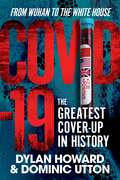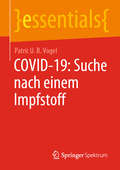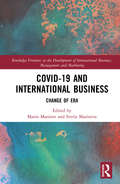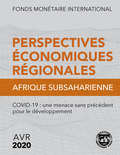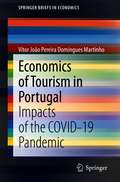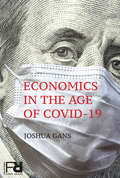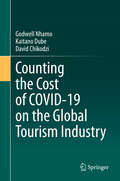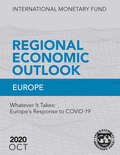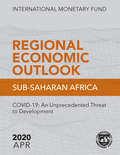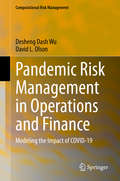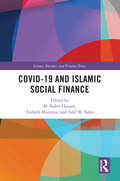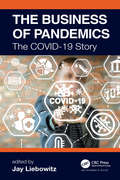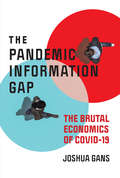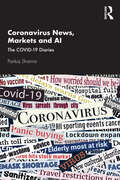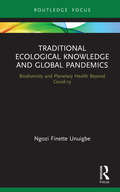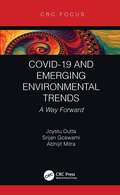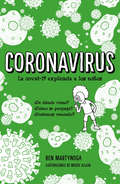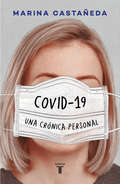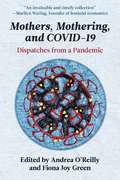Special Collections
Everything you ever wanted to know about the COVID-19 pandemic
- Table View
- List View
COVID-19
by Dominic Utton and Dylan HowardIn the final days of 2019, a new and deadly virus was quietly spreading through the city of Wuhan, China. Within six months it would kill half a million people worldwide, infect a further 10 million, and change the way all of us live, work and play forever. Now, for the first time, the real story of the greatest global crisis of the age can be told. Reporters Dylan Howard and Dominic Utton, collaborating from New York and London—infection hotspots in what would become two of the worst-hit nations on Earth—have together mapped the rise, spread and impact of the virus . . . and uncovered some explosive revelations.COVID-19: The Greatest Cover-Up in History—From Wuhan to the White House delivers the unfettered truth about what is undoubtedly the biggest political scandal of our time. It shows in unprecedented detail how governments in China, the UK, and the US not only failed to protect their citizens from the threat of the disease, but actively conspired to put their own political and economic ideologies above the lives of ordinary people. From early attempts by Beijing to silence any reports of the new virus to the inability of the WHO to act decisively; from warnings received and ignored by President Trump to decisions taken by the UK government that directly led to the loss of tens of thousands of lives; from whispers of military experiments to outlandish 5G conspiracy theories, Howard and Utton separate fact from fiction, science from hysteria, and expose a trail of dead bodies, wilful mismanagement, incompetence, arrogance, deliberate cover-ups, and outrageous lies that raise serious questions about who is really responsible for the hundreds of thousands killed by COVID-19. Through vigorous investigations, dedicated reporting, and exclusive first-person sourcing, COVID-19 unearths a more complex understanding of the rise, spread, and consequences of the first six months of the pandemic than has yet been seen, and exposes shocking revelations about the roles and motivations of the American and British governments in the crisis. The true story of COVID-19 is not just that of a silent killer that suddenly invaded the world . . . it&’s the scandal of a global tragedy that could have—and should have—been prevented. The real number of deaths and infections from the virus will never be known. The figures have not only been underreported in China, but by supposedly transparent governments in the West for reasons less connected with public safety and more to do with their own mendacity, incompetence, and corruption. Written with the urgency and tension of a thriller novel but grounded in rigorously factual reporting, COVID-19 is the essential read on the most horrifying scandal of our age.
COVID-19: Suche nach einem Impfstoff
by Patric U. B. VogelIn diesem Buch werden das Prinzip, die Stärken und Schwächen sowie der Fortschritt verschiedener Impfstofftechnologien gegen COVID-19 dargestellt. Es werden zusätzlich wichtige Begriffe wie klinische Phasen, Wirksamkeit und Sicherheit erklärt. Anhand von einigen Beispielen wird dargestellt, dass Impfstoffe auch Schaden anrichten können.
Covid-19 and International Business
by Marin A. Marinov and Svetla T. MarinovaThe Covid-19 pandemic has induced a crisis grasping the world abruptly, simultaneously, and swiftly. As a critical juncture, it ignited a change of era for international business. This book illustrates how governments have dealt with the pandemic and the consequent impacts on international business. It also explores the disrupted operations and responses of businesses as their worldwide interconnectivity has been seriously threatened. The book discourses multidirectional aspects of the effects of Covid-19 on international business, ranging from the juxtaposing forces disrupting globalization and installing a change of era through decoupling of technological, production and knowledge flows to its stimulating aspects to the strategic response on business, industry and state level. The book contains thirty chapters that offer a multidimensional interpretation of impacts of Covid-19 on international business theory and practice. Employing the latest state of knowledge on the topic, the book is aimed at international business audience - scholars, students and managers who need to understand better the nature, scope and scale of the impacts of the pandemic on international business.
Regional Economic Outlook, April 2020, Sub-Saharan Africa
by International Monetary FundA report from the International Monetary Fund.
Economics of Tourism in Portugal
by Vítor João MartinhoThis Brief discusses impacts of the COVID-19 pandemic on the Portuguese tourism sector. Taking into account real-world conditions and the importance of the tourism sector for the Portuguese economy, this book highlights the economic contexts of tourism in Portugal at the regional and municipal levels, discussing pre-pandemic economic frameworks and projecting potential implications for the future. Using data provided by Statistics Portugal, the Brief performs econometric analysis on three cases: new paradigms for overnight stays and guests, changes in tourism revenues and prospective alternatives, and a comparison of effects on changes in number of guests and overnight stays at the regional level. Providing cutting edge analysis of a dynamic global situation, this Brief will be useful for researchers interested in tourism economics and European economics as well as policymakers and industry professionals.
Economics in the Age of COVID-19
by Joshua GansA guide to the pandemic economy: essential reading about the long-term implications of our current crisis.The COVID-19 pandemic has unleashed a firehose of information (much of it wrong) and an avalanche of opinions (many of them ill-founded). Most of us are so distracted by the everyday awfulness that we don't see the broader issues in play. In this book, economist Joshua Gans steps back from the short-term chaos to take a clear and systematic look at how economic choices are being made in response to COVID-19. He shows that containing the virus and pausing the economy—without letting businesses fail and people lose their jobs—are the necessary first steps.
Counting the Cost of COVID-19 on the Global Tourism Industry
by Godwell Nhamo and Kaitano Dube and David ChikodziThis book profiles preliminary findings on the impact of COVID-19 on the travel, tourism and hospitality sector. Starting with a narrative relating COVID-19 to the global development agendas, the book proceeds with a focus on global tourism value chains and linkages between COVID-19 and the Sustainable Development Goals (SDGs). Other perspectives addressed in separate chapters include impacts of COVID-19 on various industries within the global tourism value chain including aviation, airports, cruise ships, car rentals as well as ride and share car services, hotels, restaurants, sporting, pilgrimage and religious tourism, gaming and entertainment, and the stock market. The book also includes chapters on corporate, philanthropic and public donations, as well as tourism economic stimulus packages. It then concludes with a chapter focusing on building back a better tourism sector post-COVID-19 that strongly draws from the Sendai Framework on Disaster Risk Reduction (2015-2030) and the disaster cycle. To this end, this book is suitable as a read for several professionals in disciplines such as tourism and hospitality studies, economics, sustainable development, development studies, environmental sciences, geography, politics, planning and public health.
Regional Economic Outlook, October 2020, Europe
by International Monetary FundA report from the International Monetary Fund.
Pandemic Risk Management in Operations and Finance
by David L. Olson and Desheng Dash WuCOVID-19 has spread around the world, causing tremendous structural change, and severely affecting global supply chains and financial operations. As such there is a need for analytic tools help deal with the impact of the pandemic on the world’s economies; these tools are not panaceas and certainly won’t cure the problems faced, but they offer a means to aid governments, firms, and individuals in coping with specific problems. This book provides an overview of the COVID-19 pandemic and evaluates its effect on financial and supply chain operations. It then discusses epidemic modeling, presenting sources of quantitative and text data, and describing how models are used to illustrate the pandemic impact on supply chains, macroeconomic performance on financial operations. It highlights the specific experiences of the banking system, which offers predictions of the impact on the Swedish banking sector. Further, it examines models related to pandemic planning, such as evaluation of financial contagion, debt risk analysis, and health system efficiency performance, and addresses specific models of pandemic parameters. The book demonstrates various tools using available data on the ongoing COVID-19 pandemic. While it includes some citations, it focuses on describing the methods and explaining how they work, rather than on theory. The data sets and software presented were all selected on the basis of their widespread availability to any reader with computer links.
Latam Airlines and COVID-19: Seeking Bankruptcy Protection in the United States
by Laura Alfaro and Sarah Jeong and Carlos Vilches and Mauricio LarrainOn May 26, 2020, Latam Airlines became the largest airline in the world to be driven to bankruptcy by COVID-19. With a complex debt structure and international investor composition, the company decided to file for bankruptcy protection in the United States, which offered a more flexible reorganization procedure than the local bankruptcy process. After the filing announcement, the company reached an all-time-low stock market valuation. Some experts questioned whether the bankruptcy filing of Latam Airlines in the United States could be detrimental for the development of the Chilean capital market. Even if the company succeeded financially, would it be able to adapt to a different way of flying post-COVID?
COVID-19 and Islamic Social Finance
by M. Kabir Hassan, Aishath Muneeza, and Adel M. SareaIt is said that the COVID-19 pandemic has turned back the poverty clock. As such, there is a need to have social mechanisms put in place to provide relief to those who are affected in this regard. Islamic social finance consists of tools and institutions that could be used to alleviate poverty. This book explores the impact of COVID-19 on Islamic finance to better understand the effectiveness of Islamic social finance in helping those who have been affected by poverty overnight due to the halt in all major economic activities in the context of the pandemic. Since the struggle against poverty in each country will be different, the book attempts to shed light on the experiences of different countries by presenting successful models of Islamic social finance. The book first looks at poverty and COVID-19 before delving into the role of Islamic social financial institutions and how they have risen against COVID-19. The book concludes by examining the impact of COVID-19 on Islamic microfinance. This book is the first of its kind on the subject of COVID-19, and it intends to bridge the gap in the literature.
The Business of Pandemics
by Jay LiebowitzNations and businesses across the globe have been working through the difficulties of dealing with the COVID-19 pandemic. Industry, academia, NGOs, and governments have been "feverishly" searching for ways to address this deadly virus, which may continue to spread for at least the next year and perhaps beyond (in terms of a resurgence and different strains). From a business standpoint, there have been dramatic effects on logistics and supply chains, economic downfalls, bailouts of major industries and small businesses, and far-reaching calamities from around the world. Even though the COVID-19 story is still in its making, this book focuses on the business of pandemics as applied to COVID-19. The book brings together a global panel of experts across industries and NGOs to help guide business executives and managers through the complex array of issues affecting business in the time of a pandemic. Offering solutions to the business of pandemics as applied to COVID-19, the book is written for organizational decision makers and leaders, as well as those involved in crisis management, public health, and related fields. Its chapters focus on key areas that relate to the business of pandemics, including Lessons learned to date Big data and simulation Logistics and supply-chain management challenges Conducting global business virtually Global economic impact Media and risk communication IT infrastructure and networking Social impact Online learning and educational innovations The new work-from-home environment Re-opening markets and businesses Crisis decision making using analytics and intuition With chapters authored by experts from leading organizations, including the World Health Organization, the RAND Corporation, and various universities throughout the world, The Business of Pandemics: The COVID-19 Story provides high-level guidance and insight for business leaders who must deal with the complexities and challenges presented by this unprecedented crisis.
The Pandemic Information Gap
by Joshua GansWhy solving the information problem should be at the core of our pandemic response: essential reading about the long-term implications of our current crisis.COVID-19 is caused by a virus. The COVID-19 pandemic is caused by a lack of good information. A pandemic is essentially an information problem: this is the enlightening and provocative idea at the heart of this book. If we solve the information problem, argues economist Joshua Gans, we can defeat the virus. For example, when we don't know who is infected, we have to act as if everyone is infected. If we actively manage the information problem--if we know who is infected and with whom they had contact--we can suppress the virus or buy time for vaccine development.This is an expanded version of an eBook originally published as Economics in the Age of COVID-19.
Mortgage Backed Securities and the Covid-19 Pandemic
by Luis M. Viceira and Emil Nuwan Siriwardane and Dean XuIn April 2020, global financial markets were still reeling as the Covid-19 pandemic spread rapidly across the world. Global equity markets had initially fallen by 30% in response to the pandemic, and high-yield credit markets had dropped by nearly 20%. In contrast, U.S. Treasury markets were up 20% year-to-date (YTD). Interestingly, the U.S. Mortgage Backed Security (MBS) market had been much less responsive to the health crisis, exhibiting very low volatility throughout this period and returning about 2% YTD. Maya Russell, head of asset allocation research at a large global institutional investor, must make a recommendation on whether her fund's board should invest in MBS, and if so, whether this is a good time for the fund to implement the allocation and whether it should do so pursuing an active or a passive investment approach. This case covers a wide range of topics in fixed-income investing, including duration and interest rate risk, prepayment risk, mortgage securitization, and the design of mortgage-backed securities. These concepts are analyzed from the perspectives of both individual and professional investors in fixed-income and mortgage markets.
Wilderness Safaris: Responses to the Covid-19 Crisis
by James E. Austin and Herman Leonard and Megan Epler WoodCase
Jan Swartz: Steering Princess Cruises Through the COVID-19 Crisis
by Boris Groysberg and Michael NorrisIn the summer of 2020, Jan Swartz, President of Princess Cruises, was persevering to lead her company back from the depths of the COVID-19 Pandemic. Diamond Princess, one of Princess Cruises' 18 ships was the site of one of the earliest large outbreaks of COVID-19 outside of China. The outbreak led to hundreds of cases, at least a dozen deaths, media scrutiny, government investigations, and legal proceedings. In early March 2020, Swartz made the decision to pause all global operations of her company, the first cruise company to do so. Six months later, how could Princess Cruises restart operations safely and profitably?
Coronavirus News, Markets and AI
by Pankaj SharmaCoronavirus News, Markets and AI explores the analysis of unstructured data from coronavirus related news and the underlying sentiment during its real-time impact on the world and on global financial markets, in particular. In an age where information, both real and fake, travels in the blink of an eye and significantly alters market sentiment daily, this book is a blow by blow account of economic impact of the COVID-19 pandemic. The volume: Details how AI driven machines capture, analyse and score relevant on-ground news sentiment to analyse the dynamics of market sentiment, how markets react to good or bad news across ‘short term’ and ‘long term’; Investigates what have been the most prevalent news sentiment during the pandemic, and its linkages to crude oil prices, high profile cases, impact of local news, and even the impact of Trump’s policies; Discusses the impact on what people think and discuss, how the COVID-19 crisis differs from the Global Financial Crisis of 2008, the unprecedented disruptions in supply chains and our daily lives; Showcases how easy accessibility to big data methods, cloud computing, and computational methods and the universal applicability of these tool to any topic can help analyse extract the related news sentiment in allied fields. Accessible, nuanced and insightful, this book will be invaluable for business professionals, bankers, media professionals, traders, investors, and investment consultants. It will also be of great interest to scholars and researchers of economics, commerce, science and technology studies, computer science, media and culture studies, public policy and digital humanities.
The Coronavirus (COVID-19) Pandemic and the Global Economy (A)
by Alberto F. Cavallo and Christian GodwinIn early 2020, a coronavirus pandemic swept the globe, ushering in unprecedented disruptions to the global economy. Both supply and demand were decimated by lockdowns and border closings, as well as reduced spending by fearful consumers. In response, governments around the world made equally unprecedented policy moves, spending trillions of dollars on fiscal stimulus measures to bridge the gap during the self-imposed shutdown. As the pandemic progressed, governments had to weigh the costs between loss of life due to opening up their economies and the economic devastation caused by delaying a reopening.
Traditional Ecological Knowledge and Global Pandemics
by Ngozi Finette UnuigbeThis book demonstrates the importance and potential role of Traditional Ecological Knowledge in foreseeing and curbing future global pandemics. The reduction of species diversity has increased the risk of global pandemics and it is therefore not only imperative to articulate and disseminate knowledge on the linkages between human activities and the transmission of viruses to humans, but also to create policy pathways for operationalizing that knowledge to help solve future problems. Although this book has been prompted by the COVID-19 pandemic, it lays a policy foundation for the effective management or possible prevention of similar pandemics in the future. One effective way of establishing this linkage with a view to promoting planet health is by understanding the traditional ecological knowledge of indigenous peoples with a view to demonstrating the significant impact it has on keeping nature intact. This book argues for the deployment of traditional ecological knowledge for land use management in the preservation of biodiversity as a means for effectively managing the transmission of viruses from animals to humans and ensuring planetary health. The book is not projecting traditional ecological knowledge as a panacea to pandemics but rather accentuating its critical role in the effective mitigation of future pandemics. This book will be of great interest to students and scholars of traditional ecological knowledge, indigenous studies, animal ecology, environmental ethics and environmental studies more broadly.
COVID-19 and Emerging Environmental Trends
by Abhijit Mitra and Joystu Dutta and Srijan GoswamiThe extensive safety restrictions imposed globally due to the COVID-19 pandemic have brought significant changes to almost all environmental parameters. The largest pandemic of the century has left an indelible mark on all aspects of human life and the environment. This book revolves around COVID-19 and its influence on all biotic and abiotic components on earth, with a focus on the regulatory role of air quality during the pandemic, environmental toxicity and susceptibility to COVID-19, and the impact of the lockdown on different ecosystems. The book fundamentally explains the biology of SARS-CoV-2 and the pathophysiology and epidemiology of COVID-19. Dedicated chapters highlight the ongoing global cutting-edge research on COVID-19, control and safety measures, and public health concerns. COVID-19 and Emerging Environmental Trends: A Way Forward is aimed at graduate and postgraduate students as well as researchers in environmental and medical science, health and safety, and ecology. This book offers a multiperspective and multidisciplinary approach to the discussion of the pandemic as well as emerging environmental issues, current trends, and a way forward. As humanity stands face-to-face with the largest global crisis in recent times, this book helps readers to easily understand its various aspects from a beginner’s perspective, without going into the intricate technicalities of medical science or environmental science, and beautifully juxtaposes critical issues with lucid language and flexible scientific explanations.
Coronavirus
by Ben Matynoga¿Cómo un virus tan pequeño y frágil ha logrado cambiar el mundo? Coronavirus, el libro ilustrado que explica a los niños todo lo que deben saber sobre la covid-19. Escrita por el científico Ben Martynoga. ¿De dónde viene? ¿Cómo se propaga? ¿Podemos vencerlo? El coronavirus es 15.000 veces más pequeño que una pulga y podemos matarlo con una pastilla de jabón. ¿Cómo un virus pequeño y frágil cambió el mundo? Sumérgete en el fascinante mundo de los virus junto al científico Ben Martynoga y descubrirás cosas divertidas y a la vez aterradoras de la pandemia que ha cambiado el mundo. Una fascinante historia sobre cómo las células humanas han sido secuestradas por un virus y sobre cómo nuestro cuerpo responde. En el camino, aprenderás qué son los virus, cómo funcionan y cómo podemos vencerlos, o al menos, aprender a convivir con ellos.
COVID-19 Una crónica personal
by Marina CastañedaCon su particular humor y voz, Marina Castañeda hace un recorrido por su experiencia a partir del encierro por esta pandemia que ha sacudido al planeta entero. Con su mirada aguda reflexiona sobre distintos temas como la comunidad, la violencia de género o la discriminación. Tras una larga era de estabilidad que nos había permitido vivir en (relativa) paz y prosperidad, nos habíamos acostumbrado a la libertad -de movimiento, de expresión, de asamblea, de religión y de estilo de vida. Como parte de las clases medias que habían surgido desde la Segunda Guerra Mundial, podíamos pagarnos vacaciones, restaurantes, y comprarnos toda clase de bienes y servicios que antes eran de lujo. Nos habíamos vuelto consumistas e individualistas de ultranza. Nos habíamos desprendido poco a poco de nuestros lugares y familias de origen y de nuestros vecinos y barrios. Nos interesaba poco la población "invisible" que nos permitía vivir a gusto sin ocuparnos de las bases materiales de la existencia cotidiana. Pedíamos algo en línea y milagrosamente llegaba a la puerta de nuestras casas. Defendíamos nuestros derechos sin ocuparnos demasiado de los demás. Nuestros hábitos de habían vuelto una jaula de oro. El coronavirus cambió todo. Nos hizo recordar, o tomar consciencia, de muchas cosas que habíamos dado por sentadas: dependíamos de nuestros empleados de servicio, de nuestros vecinos, de todos los "invisibles", e incluso de las autoridades para imponer las medidas sanitarias indispensables, orientarnos y apoyarnos. Esta nueva forma de concebir los servicios públicos, como un gasto que debe cubrir cada ciudadano en lo personal, era el resultado de más de 30 años de recortes presupuestarios, gastos gubernamentales enfocados en la guerra contra el narco, apoyos a los bancos y grandes empresas. El coronavirus no hizo más que sacar a relucir este abandono por parte del gobierno de sus funciones más esenciales. De pronto nos descubrimos huérfanos. Lo único que podremos esperar es que habremos aprendido sus grandes lecciones. Ojalá lo hagamos mejor la próxima vez.
Mothers, Mothering, and COVID-19
by Andrea O’Reilly;Fiona Joy GreenThere has been little public discussion on the devastating impact of Covid-19 on mothers, or a public acknowledgement that mothering is frontline work in this pandemic. This collection of 45 chapters and with 70 contributors is the first to explore the impact of the pandemic on mothers' care and wage labour in the context of employment, schooling, communities, families, and the relationships of parents and children. With a global perspective and from the standpoint of single, partnered, queer, racialized, Indigenous, economically disadvantaged, disabled, and birthing mothers, the volume examines the increasing complexity and demands of childcare, domestic labour, elder care, and home schooling under the pandemic protocols; the intricacies and difficulties of performing wage labour at home; the impact of the pandemic on mothers' employment; and the strategies mothers have used to manage the competing demands of care and wage labour under COVID-19. By way of creative art, poetry, photography, and creative writing along with scholarly research, the collection seeks to make visible what has been invisibilized and render audible what has been silenced: the care and crisis of motherwork through and after the COVID-19 pandemic.
Best Buy's Corie Barry: Confronting the COVID-19 Pandemic
by William W. George and Amram MigdalThis case examines the leadership of Corie Barry, the new CEO of Best Buy, with a focus on actions the company took in 2020 to adapt to the COVID-19 pandemic. The case includes a history of Best Buy's strategy and leadership, including the transitions between the company's founder and the subsequent four CEOs. In particular, the career trajectory of CEO Corie Barry is described in detail. Regarding Best Buy's response to COVID-19, the case details the company's scenario planning and operational adjustments, including the temporary closure of all stores followed by the rapid establishment of curbside-pickup customer-order-fulfillment operations at roughly 1,000 store locations in the U.S. The case also attends to leadership's decisions to furlough more than 51,000 frontline employees, suspend in-home services, and subsequently resume in-store services under modified operating procedures.
